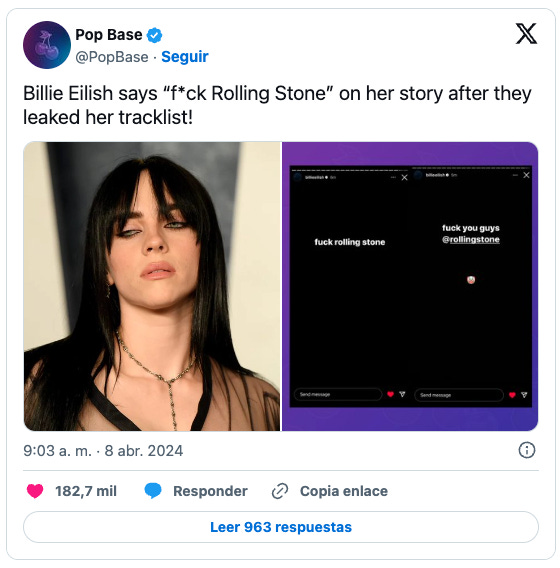By the time you read this, a new Taylor Swift album will be on streaming. But while writing this, four hours before the rumored 2am EDT release time of The Tortured Poets Department, plenty of Swifties are already dissecting every note on Swift’s eleventh original album thanks to an alleged leak that appeared sometime on Wednesday.
Leaking albums used to be a much bigger deal. In the mid-aughts, significant releases by Jay-Z, Eminem, Mariah Carry, Blink-182, Radiohead, and hundreds more appeared online weeks before their official release dates, much to the consternation of the artists and the labels who watched CD sales plummet throughout the decade. If fans had difficulty not stealing music instead of buying it on iTunes, what were the odds they could resist downloading an album that wasn’t otherwise available yet?
A few weeks ago, Rolling Stone interviewed the director of How Music Got Free, a new documentary that looks back at the Wild West days of Limewire and the fascinating story of how a single individual working at a CD plant in North Carolina became patient zero in a pandemic of music piracy that almost killed off the entire industry and set the stage for the streaming ecosystem we all live with today.
Living with streaming has its share of problems, but one upside has been that artists, for the most part, do not have to worry about their music being leaked. The expectation of an orderly album rollout has become so ingrained in today’s generation of superstars that it’s gotten to the point where Billie Eilish lashed out at Rolling Stone for leaking the tracklist of her upcoming album.
It's not just the artists who are acting precious. Where being a fan of music was once viewed as a justification for stealing every morsel one could get ahold of, today’s stans literally pay money for vinyl records that never touch a turntable. This sort of model-consumer behavior was evident as Swiftie sentiment on the album leak split between those who indulged in an early sneak peek and those who took a principled stand against such anti-artist behavior. We tried to find some examples of this debate between a fandom divided, only to discover that X has blocked any searches for “Taylor Swift leak” on the platform.
We’ll pause here only to point out that X blocking this particular free speech is a surprising decision for the only major social media platform currently being sued for mass copyright infringement for operating without a licensing deal with the major labels. As is often the case with Elon — it is rules for thee, but not for me.
Still, we have previously pondered what the world might have looked like had tech companies in the ’00s actually attempted to obey the law. We’re not here to provide cover for the world’s most antagonistic billionaire, but we’re aware of the way broadband ISPs of the 2000s profited obscenely by facilitating the transmission of pirated materials across their networks. We’ve also discussed how the safe harbor rules of the 1998 Digital Millennium Copyright Act allowed today’s tech titans to grow too big to fail by gorging on the intellectual property of millions of creators.
But the point isn’t to re-litigate the past.
In 2024, the disruption at the door has nothing to do with piracy as we’ve always imagined. Instead, generative AI poses an entirely new existential threat to the music industry (and plenty of other vocations) thanks to its use of copyrighted material to train the algorithms that just so happen to devalue the same materials. Metaphorically speaking, the AI intakes nutritious copyright and expells — shit?
The legality of this practice will be decided by a litany of lawsuits in the coming years as everyone from The New York Times to Universal Music goes after various AI operators for allegedly using their IP illegally. Other less litigious agreements are also being forged, such as the deal struck last week between the major labels and SAG-AFTRA to limit the former’s ability to use AI to recreate the voices of singers repped by the latter.
The shortcoming of this particular deal is that SAG-AFTRA only represents vocalists, not instrumentalists. The widder systemic problem is that much like the RIAA’s attempts to halt piracy in the 2000s by shutting down Napster — only to have Kazaa and Limewire pop up in their wake — this whack-a-mole approach is unlikely to stop the coming AI assault on all manner of human creativity.
If the relatively brief history of digital innovation teaches us anything, it’s that legal action can do little to turn the tide. And regulation, when it does come, will err on the side of giving new tech a pass as it promises future prosperity. Never mind worrying about how that prosperity may be distributed.
No one is saying that the immense growth in global broadband and mobile connectivity in the 2000s wasn’t a net good for humanity. But let’s not pretend that the catalyst for growth wasn’t customers deciding that paying a single monthly ISP subscription in exchange for all the music (and later, movies) one could torrent was an offer they couldn’t refuse.
But perhaps there is a different way. At present, only copyright owners have legal standing to sue IP offenders, which has created the current catch-as-catch-can approach to stopping violations. Yes, the government can levy criminal penalties against willful infringers, but once the Feds start jailing AI developers, it is certain to halt progress rather than manage it.
These current laws are ensconced in the Copyright Act of 1976, which has been with us for a long time. But they could be changed. What if a compulsory license allowed AI innovators to continue using protected IP to train new models, but with a mechanism that guarantees the owners of said IP will be compensated if/when these AIs become as immensely profitable as investors seem to think is likely?
We’re not lawyers, but a similar framework is currently being pushed as part of the Living Wage for Musicians Act. Under the proposed legislation, streamers would have to pay fees based on revenue to a government entity empowered to collect and distribute the funds. So, obviously, there is a legal path to collecting similar fees for training AI on copyrighted materials.
The alternative, we fear, is more middle-class creators — not just musicians, but writers, designers, and every other creative professional you can think of — will continue being pushed into poverty. At the same time, the tech elites keep consolidating wealth until the whole thing tips over and nobody can afford to buy whatever it is business is selling.
Does that sound alarmist? We sure hope it turns out to be. In the meantime, if you have additional thoughts about how to manage AI, we’d sure like to hear from you.
TAKEAWAYS
Salient statements from this week’s music news.
1. Live Nation Will Soon Face DOJ Antitrust Lawsuit
Federal regulators are reportedly planning to sue the concert giant over claims that it abused its dominance to undermine competition.
Takeaway: The new Justice Department lawsuit could unravel a settlement agreement that Live Nation reached with the department in 2010 over the Ticketmaster merger. The settlement conditions were supposed to expire after a decade. But in 2019, antitrust enforcers got the deal extended through 2025 after finding that Live Nation violated the original pact by bullying venues into using its Ticketmaster subsidiary.

2. Concord Makes $1.4bn Cash Bid to Acquire Hipgnosis Songs Fund’s Assets
The board of the publicly-traded Hipgnosis Song Fund has accepted Concord’s offer but a “call option” with privately owned Hipgnosis Song Management could “guzump” the deal.
Takeaway: Will Blackstone front the money for HSM to launch a matching bid?; (b) Would HSM’s ‘call option’ withstand any legal tests from the HSF board, especially if the HSF board attempts to fire HSM as investment adviser for ’cause’? The second of these questions becomes crucial when you consider a damning report on some of HSM’s accounting practices at HSF, published by Shot Tower Capital last month.

3. How the NBA Added Music and Fashion to Its Bench Strength
Tammy Henault, CMO of the NBA, shared some of the strategies that helped the association stand out from other pro sports leagues
Takeaway: “The NBA in and of itself is a lifestyle brand at its core,” she said, noting the NBA will be present at Coachella as a brand.





